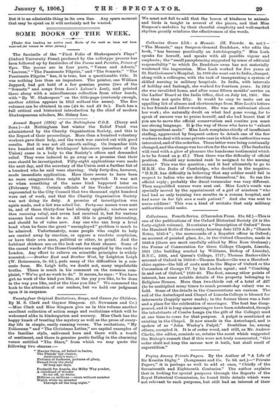Annual Report (1904) of the Nottingham C.O.S. (Derry and Sons.)—At
Nottingham last winter the Relief Fund was administered by the Charity Organisation Society, and this is the Report of their proceedings. More than a hundred voluntary workers gave their help, and the work was carried out with good results. But it was not all smooth sailing. On Dee,ember 15th two hundred and fifty bricklayers' labourers (members of the Union) came in a body to the Society's offices and demanded relief. They were induced to go away on a promise that their case should be investigated. Fifty-eight applications were made the next day, and the secretary of the Union sent a further list of a hundred who he said were starving. Only forty-five, however, made immediate application. Here there seems to have been no more exaggeration than might be expected. It was not so when something of the same kind happened later on (February 7th). Certain officials of the Trades' Association represented to the City Council that two thousand eight hundred were out of work, and that the Charity Organisation Society was not doing its duty. A promise of investigation was again made, and a list was asked for. Forty-one names were sent in, and of these thirty-four had already applied ; nineteen were then receiving relief, and seven had received it, but for various reasons had ceased to do so. All this is greatly interesting, and should be of value now. Any one who can keep a level head when he faces the great "unemployed" problem is much to be admired. Unfortunately, some people who ought to help are carried away by emotion, or oppose a resolute scepticism, or have their own axes, political or other, to grind. And the habitual shirkers are on the look out for their chance. Some of the casual wards of the Home Counties are emptied by the rush to London. Any effort to relieve on scientific principles is widely resented.—Brother East and Brother West, by Leighton Leigh (W. Heinemann, 3s. 6d.), puts many of the difficulties in a con- crete form. Mr. Leigh tells, we doubt not, many unpalatable truths. There is much in his comment on the common com- plaint, "We've got no work to do." It means, he says : "You have got no work of the kind you like, at the pay you like, to be done in the way you like, and at the time you like." We commend the book to the attention of our readers, but we hold our judgment upon it in suspense.


















































 Previous page
Previous page